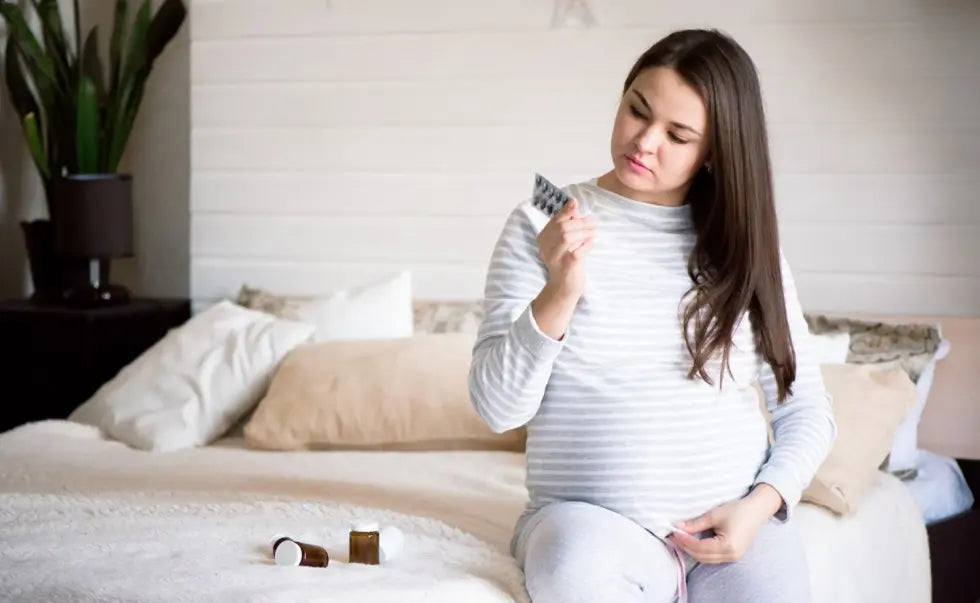As a new mom, there’s already so much on your plate, diaper changes, sleepless nights, and adjusting to life with your little one. But then, as if that’s not enough, your hair starts shedding. Postpartum hair loss is an emotional rollercoaster, and it’s easy to feel like it’s just one more thing to deal with. The good news? It’s completely normal, and it’s temporary.
In this guide, we’re diving into a question that many moms have when it comes to improving hair health: Are hair growth supplements better than multivitamins for regrowing hair?
We’ll explore both options, explain how they work, and help you decide which might be the best solution for your hair health.
1. Understanding Postpartum Hair Loss and Hair Health
What is Postpartum Hair Loss?
Postpartum hair loss is a condition many women experience after giving birth. Known as telogen effluvium, it occurs when hormone levels drop and the body shifts out of the "pregnancy glow" phase. During pregnancy, your body retains more hair than usual, but after delivery, a significant amount of hair enters the shedding phase all at once.
For most women, this hair loss begins around 2-3 months postpartum and can last for 6 months or more. It's stressful, but keep in mind it’s temporary. Your hair will grow back eventually — patience is key!
Key Triggers:
- Hormonal fluctuations
- Nutrient deficiencies
- Stress from the demands of new motherhood
What You Need for Healthy Hair Growth
Regrowing healthy hair post-baby requires the right nutrients to nourish hair follicles and support scalp health. Key nutrients include:
- Biotin (Vitamin B7): Supports hair follicle health and boosts hair growth.
- Collagen: Provides structure to hair and promotes scalp health.
- Vitamin D: Crucial for the hair growth cycle.
- Zinc: Supports tissue growth and repair, including hair follicles.
These nutrients are essential in the healing process of postpartum hair and will be key to your choice of supplements moving forward.
2. Hair Growth Supplements – What They Are and How They Help
What Are Hair Growth Supplements?
Hair growth supplements are specially formulated to provide high doses of vitamins, minerals, and other nutrients that promote hair health. These supplements often contain ingredients that are specifically tailored to hair care, such as biotin, collagen, and zinc, all are critical for stimulating hair growth.
How They Work:
Hair growth supplements target the root of hair loss, nourishing hair follicles to improve strength and encourage regrowth. Ingredients like biotin and collagen help rebuild hair and scalp health, while vitamin D supports healthy hair follicle regeneration.
Some popular hair growth supplements may also include nutrients for overall wellness, which contribute to balanced nutrition and prevent hair loss due to deficiencies.
Top Ingredients to Look For in Hair Growth Supplements:
- Biotin: Helps with hair thickening and growth.
- Collagen: Replenishes the building blocks for strong hair.
- Vitamin C: Protects hair from damage caused by free radicals.
- Vitamin D: Regulates hair growth cycles.
- Zinc: Boosts immune function and prevents hair shedding.
Examples of best supplements for hair growth
If you're looking for a best supplements for hair growth that is postpartum-friendly option, Baby Blues Postpartum Hair Vitamins are a great choice. These gummies are designed with new moms in mind, providing biotin, collagen, and other hair-boosting nutrients that can accelerate regrowth and improve the overall health of your hair.
3. Multivitamins – The General Health Solution
What Are Multivitamins and How Do They Differ from Hair Growth Supplements?
Multivitamins are commonly used to supplement your diet, providing a wide range of essential vitamins and minerals for overall health. However, unlike hair growth supplements, they aren't usually formulated with a focus on hair health. Multivitamins typically contain a broader spectrum of nutrients that address various bodily functions (like energy levels, immune support, and heart health) but may not deliver the same level of targeted support for hair regrowth.
How They Work:
While multivitamins can provide some of the necessary nutrients for hair growth, such as biotin and vitamin D, the dosages may be lower than what you would find in a dedicated hair growth supplement. Multivitamins are great for supporting your general wellness, but they might not be potent enough to target specific hair concerns.
Are Multivitamins Enough for Hair Health?
Multivitamins can definitely help ensure you're not missing out on key nutrients that are essential for your health. However, they don’t provide the same targeted support for hair thickness and growth as supplements specifically formulated for hair.
When to Choose Multivitamins:
If you're seeking a general health boost, especially if you’re a busy mom who needs an easy way to cover all your nutritional needs, a multivitamin is a great place to start. However, if your main focus is supporting hair regrowth or addressing hair thinning or postpartum shedding, you’ll likely benefit more from a hair growth supplement.
One great option to support your overall health while still giving your hair the nutrients it needs is Baby Blues Mom's Multi Daily Multi-Vitamin Gummies. These gummies are packed with essential vitamins and minerals that support immune health, energy levels, and overall wellness, including biotin and vitamin D to help with hair strength. They’re a convenient and effective way to make sure you’re taking care of your health while keeping hair health in mind.
Popular Multivitamin Ingredients for Hair Health:
- Vitamin D: Supports the growth of hair follicles.
- Biotin: Enhances hair strength and thickness.
- Iron: A deficiency in iron can contribute to hair loss.
4. Hair Growth Supplements vs. Multivitamins – Which Is Better for Hair Health
Comparison of the Two
When it comes to regrowing your hair and improving its health, hair growth supplements have the edge. Here’s why:
- Targeted Support: Hair growth supplements contain specific ingredients designed to nourish hair follicles and encourage growth. Multivitamins, on the other hand, are broader and don’t focus on one particular area.
- Higher Nutrient Concentrations: Hair supplements typically contain higher doses of biotin, collagen, and other essential nutrients, making them more effective in promoting hair regrowth.
- General Health vs. Specific Needs: If you're concerned about overall health and want a comprehensive supplement, multivitamins are a great choice. But if your main goal is to combat hair thinning or postpartum hair loss, hair growth supplements are a better option.
When Should You Choose Hair Growth Supplements?
- Postpartum hair loss: These supplements provide a higher dose of hair-boosting nutrients that directly address the needs of postpartum hair health.
- Thinning or damaged hair: Hair growth supplements contain ingredients like collagen and biotin that rebuild hair strength and density.
- Slower regrowth: If your hair regrowth is slower than expected, a dedicated supplement might give your hair the jumpstart it needs.
When Should You Choose Multivitamins?
If you're looking for general wellness and have no specific hair health concerns.
If you want a basic, all-around supplement to fill in nutritional gaps (e.g., vitamin deficiencies that may affect hair, skin, and nails).
5. Other Factors to Consider for Hair Health
Diet and Lifestyle for Healthy Hair
While supplements are important, a healthy diet and lifestyle also play a crucial role in your hair’s health. Make sure you’re consuming plenty of protein, healthy fats, and vitamins through food. Drinking enough water and managing stress will also support optimal hair health.
Herbal Supplements for Hair Health
If you prefer natural options, consider herbal supplements like saw palmetto or horsetail extract. These have been used for centuries to promote hair growth and prevent shedding. Herbal supplements can be a great addition to your routine alongside your main hair growth supplement.
Consulting a Professional
If you notice excessive hair loss that goes beyond the normal postpartum shedding, it might be worth consulting a dermatologist or healthcare professional. They can check for any underlying issues, such as thyroid imbalances or iron deficiency, that may be contributing to hair loss.
6. Customer Experiences and Testimonials
Real experiences from other moms who’ve tried hair growth supplements can help you make a more informed decision. Many women have found that supplements like Baby Blues Postpartum Hair Vitamins helped them regain thicker, stronger hair, especially after childbirth.
“Love these! Only one bottle in and I am seeing a big difference in my hairline. I started to lose my hair at an aggressive rate right around 3. 5 month pp. These vitamins have helped slow the loss and accelerate new growth! I have always had issues with my hairline and this is helping tremendously. Not to mention, they are super tasty! Can’t wait to see my results over the next couple of months!” - AMeyer

“You can see my before hairline and then after. I am 5 month PP and it has filled in with new baby hair!” - Amy

"These gummies worked their magic in a matter of 3 weeks. They taste great making them go down easy. I am a breastfeeding mother but did not notice any changes in milk production."- Abigail

To check the more detailed and complete reviews please here.
Conclusion
Whether you choose hair growth supplements or multivitamins, the key is to give your body time to respond. Hair regrowth is a slow process, but with the right support, you’ll start to see results. Remember: you’re doing an amazing job as a mom, and your hair will bounce back. Supplements can help, but don't forget the importance of patience and a balanced lifestyle.
If you’re ready to support your hair health with a product specifically designed for postpartum regrowth, check out Baby Blues Postpartum Hair Vitamins today. Packed with biotin, collagen, and other essential nutrients, these gummies are your new best friend in the quest for stronger, fuller hair.







